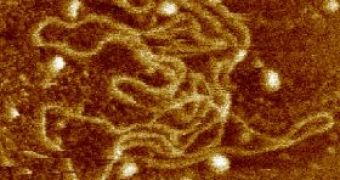As antibiotic resistant strains of bacteria are increasingly spreading, one day current antibiotics could be useless against deadly bacteria.
Moreover, a recent study found that "stealth" plasmids (circular "DNA parasites" of bacteria) (photo) can deliver to bacterial hosts not only antibiotic-resistance genes, but also a protein that rises the survival and spreading chances of the already antibiotic-resistant hosts.
Plasmids were first found 30 years ago and can transfer from one bacterium to another through a sex-like process (conjugation).
But plasmids often do not carry only their own DNA, but also bits of former host DNA, carrying genes, like those that induce antibiotic resistance.
Usually, plasmids come with a trade off: it can decrease the host's fitness (especially the growth ability).
Stopping antibiotic treatment eliminates the advantage of the host, as plasmid-free bacteria will outcompete the new microbe--plasmid combination.
But new discovered plasmids use a stealth gene (sfh) which does not reduce the host's fitness.
In Salmonella, antibiotic resistant bacteria were able to survive even after stopping yhe antibiotic therapy. Sfh encodes a bacterial protein which organizes the DNA and controls the activity of many genes, including those that encode toxins. "The bacterial protein, called H-NS, is a very important molecule and affects the way a bacterial pathogen operates. By bringing in its own supply of the H-NS-like stealth protein (called Sfh), the plasmid avoids interfering with the natural balance of H-NS and DNA in the cell," explained Professor Charles J. Dorman at Trinity College Dublin, Ireland.
"Our work suggests that bacterial fitness can be manipulated by altering the proportions of H-NS and DNA in the cell, perhaps through the use of drugs, an insight that may be exploited in the future to prevent or to fight infection."
The supply of protein brought by the plasmid is clearly an advantage, and the normal supply of H-NS in the bacterium may become limited when new normal plasmid DNA enters the cell. Plasmid lacking the sfh gene affects Salmonella very rapidly. "These plasmids are found in many pathogenic bacteria including those that cause typhoid and paratyphoid fever. Both of these diseases are increasing in the developing world and in the UK we are seeing more and more imported cases", said Dr John Wain at the Wellcome Trust Sanger Institute in Cambridge, UK.
"But understanding is not enough: we now need to exploit this information to try to prevent the plasmid spreading any further."

 14 DAY TRIAL //
14 DAY TRIAL //